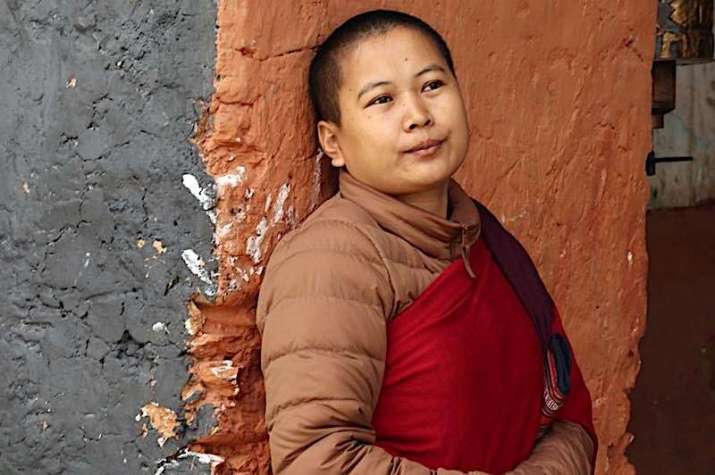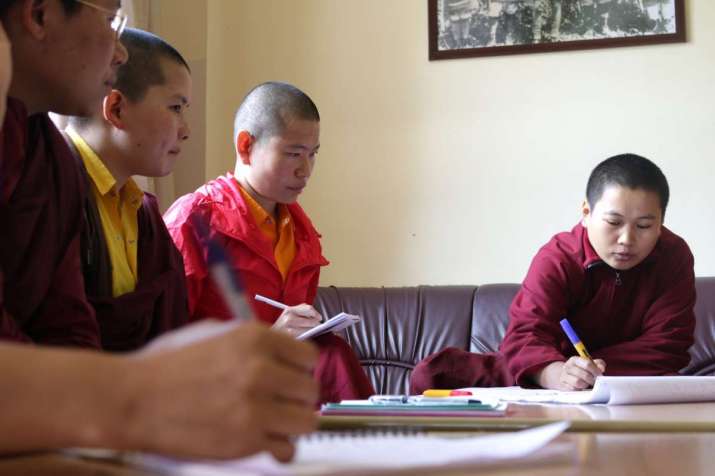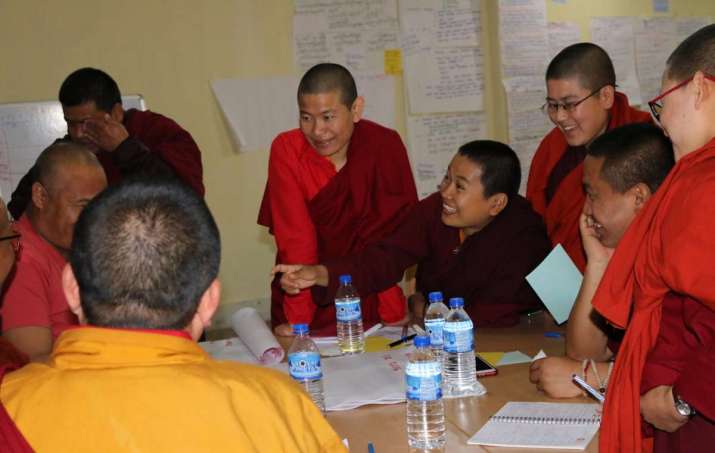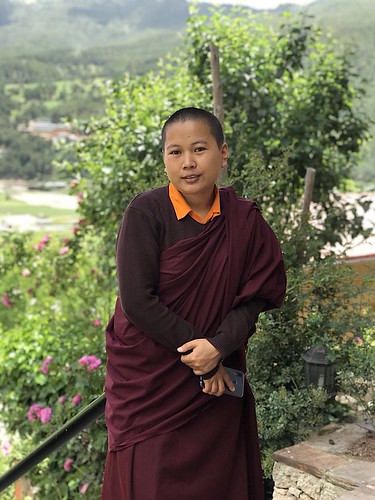FEATURES
My Story: Walking the Path of a Female Monastic in Bhutan
 Ani Namgyel Lhamo. Image courtesy of the author
Ani Namgyel Lhamo. Image courtesy of the authorI am a humble Buddhist nun from Bhutan. As a young girl, it was my dream to become a nun and I am happy that my strong past karma took me to the place I wished to be and allowed me to realize this dream. I grew up as the only girl among five siblings and, at the age of 14, I left home to become a nun. Fortunately, my family supported my dream and they have continued to do so to the present day.
In 1999, I followed one of my monk uncles who was traveling to Nepal to undertake a three-year retreat. There he helped me meet his old teacher, Khenchen Thubten Odser, who was also the founder of Ngodup Charbabling Nunnery in Nepal, and he ordained me as a nun. After my ordination, I was trained in monastic and other basic religious studies under the guidance of Khenchen’s students. After three years at the nunnery, I traveled to Sarnath in India to further my education at the Central Institute for Tibetan Higher Studies. I have always felt that just to be a nun without a proper education is worthless, so I decided to go where I could receive a quality Buddhist education. Once again, my uncle took me to the institute, where I was able to study Buddhist philosophy.
I’m often asked why I left Bhutan and traveled all the way to India to study Buddhism. When I was growing up there weren’t many nunneries in Bhutan and there was no proper education system in place for the nuns in those few nunneries. Instead the nuns would spend their lives reciting prayers. If there had been nunneries in Bhutan that offered a good monastic education, I would certainly have chosen to study there. However, I am now extremely happy and proud to see Bhutanese nunneries today developing and offering a better education system. Now we have nuns who have completed nine years of study in Buddhist philosophy, equivalent to a master’s degree, and our nuns can now study in Bhutan in order to earn such degrees, without the need to travel outside of the country.
 Developing a key message for promoting child well-being at monastic institutions in Bhutan. Image courtesy of the author
Developing a key message for promoting child well-being at monastic institutions in Bhutan. Image courtesy of the authorSo how am I using what I've learned in order to be useful to the nuns of Bhutan today? While studying at the Central Institute of Tibetan Studies, I heard about the Bhutan Nuns Foundation (BNF) through Bhutan’s former prime minister, when he visited Varanasi. It was he who encouraged me to return to Bhutan and work on behalf of Bhutanese nuns through the BNF. I completed my master's degree in Buddhist philosophy in May 2013, and from July of the same year I joined the BNF. I am very happy to say that I am the only nun working in a charitable organization that looks after the welfare of nuns in my country.
I now serve as an assistant program officer at the BNF, where I oversee projects. My work involves creating different types of training programs needed by the nuns and attending various meetings to share and discuss issues of concern to nuns—their stories, and their dreams of what they can contribute to society. In addition, I visit nunneries across the country to learn about the difficulties they experience and the realities of their living situations. By working with the BNF, I am able to advocate and promote the importance of education for nuns and to encourage our nuns to undertake both traditional and modern education, both of which are needed in the 21st century.
Ironically, most Bhutanese people tend to respect nuns because they live simple lives yet, at the same time, they also look down on nuns who lack an education and live in humble circumstances. However, times are changing and now there are Bhutanese nuns with master’s degrees and women who have been ordained as nuns after obtaining college degrees.
I am very optimistic that we shall see a positive future for our nuns. For that, I, as an individual and as a member of the BNF, am determined to work hard to bring about change, both in the mindsets of Bhutanese people and in the lives of the nuns themselves. Speaking as a Buddhist nun, it can be very challenging if we are deprived of important opportunities—especially when society has different expectations of the way nuns should be. In this case, we have to raise our voices and make an extra effort to realize our potential.
I love my life as nun and working with the BNF for the benefit of Bhutanese nuns. I have come to realize that, first and foremost, our nuns need a good education. This is the primary tool for breaking down all barriers, even one’s own ignorance. Now, with the assistance of the BNF, nuns in Bhutan have a platform from which to learn, to improve, and to move forward in so many areas that were never available before.
 Workshop on child welfare at monastic institutions in Bhutan. Image courtesy of the author
Workshop on child welfare at monastic institutions in Bhutan. Image courtesy of the authorFounded in 2009 under the patronage of Her Majesty the Queen Mother Ashi Tshering Yangdon Wangchuck, the Bhutan Nuns Foundation is a non-profit organization working to enhance access to basic and higher education, and to improve the day-to-day livelihoods of Buddhist nuns and other grassroots women in the Kingdom of Bhutan. The BNF aims to empower and educate Bhutanese girls and women, and to improve the living conditions and economic vitality of rural villages, in turn helping to preserve the country’s rich Buddhist culture in the face of rapid economic development.
Most nunneries in Bhutan, especially those located in remote areas, are still struggling to meet their basic needs and most of the nuns live in deplorable conditions. The purpose of BNF, therefore, is to help make nunneries leading agents and self-reliant institutions for girls and women who choose to become nuns. The BNF seeks to help nuns be more socially responsible and to become proactive and effective in helping their communities and the country of Bhutan as a whole. The BNF wants nuns to be socially engaged participants of society rather than passive recipients.
See more
Related features from Buddhistdoor Global
Changing Mindsets: Tashi Zangmo and the Bhutan Nuns Foundation
An Agent of Change: Empowering Bhutanese Nuns
Palri Buddha Park - A Conservation Project in East Bhutan
Related news from Buddhistdoor Global
Bhutan, the World’s Only Carbon-negative Nation, Sets an Example of Environmental Stewardship for a Planet Grappling with Climate Change
Bhutan Nuns Foundation Poised to Launch New Training Center for Female Monastics with First Resident Nuns
Prime Minister of Bhutan Proposes Founding of International Center of Vajrayana Buddhism
Buddhistdoor Global Special Issue 2018















